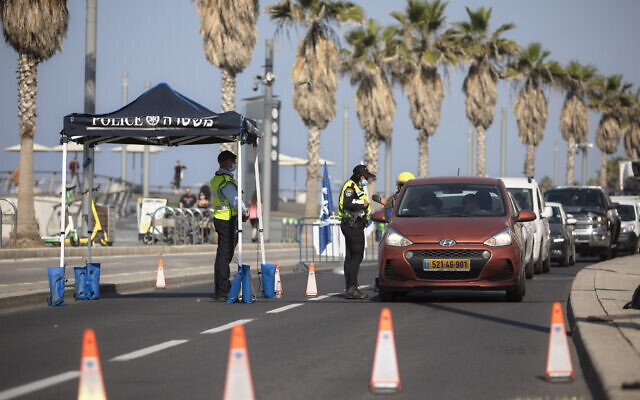Blue and White has conditioned its support for nationwide closure on passage of a law that will crack down on violators; ministers also expected to extend airport shutdown

The Knesset will convene on Sunday afternoon to vote on a bill that will raise fines for lockdown violators, paving the way for the extension of the nationwide closure.
The lockdown, now entering its fourth week, is currently set to end overnight Sunday-Monday. Defense Minister Benny Gantz’s Blue and White party has said it will not approve extending the lockdown until the bill on raising fines is passed into law, amid headlines about a lack of enforcement in ultra-Orthodox areas leading to gross violations of the health guidelines. The party argues the measure is necessary as part of a general increase in enforcement of lockdown regulations to effectively curb the virus.
Knesset Speaker Yariv Levin said Friday that all coalition factions had agreed to vote on the bill to raise fines for those who violate virus restrictions.
The Knesset plenum will convene at 2 p.m. Sunday for the second and third readings on the fines bill. Ministers will then meet later Sunday evening on the lockdown.

Gantz had demanded that the Knesset be quickly convened Thursday to pass the bill on raising fines ahead of a planned cabinet meeting later in the evening. Appearing to accept that demand, Prime Minister Benjamin Netanyahu said that he supports passing the legislation “as written” as soon as possible and that the Knesset should convene Thursday to vote on it. No Knesset session was held, however, and as a result, no cabinet meeting either.
Netanyahu and Gantz, although theoretically aligned on the need for the lockdown to continue, are divided over the issue of raising fines for those who violate the closure.
Gantz has vowed that Blue and White will not agree to extend the lockdown unless fines are raised and enforcement is applied evenly to all communities. However, the move to raise the fines is opposed by Netanyahu’s ultra-Orthodox allies as many institutions in Haredi society have continued to operate throughout the lockdown, angering critics who say that the current level of enforcement isn’t enough.

When the cabinet does convene, likely Sunday evening, opinions are divided on how many days to add to the closure, which has shuttered all non-essential businesses and the education system, with the exception of special education institutes.
While the Health Ministry reportedly wants to add another week, ending the closure after the weekend to take advantage of two days when much of the country would not be at work anyway, some ministers prefer an extension of just a few days.
In addition, the Health Ministry is reportedly opposed to suggestions that some aspects of the lockdown be eased, in particular by reopening parts of the education system and certain commercial activities.
According to Channel 12, health officials are considering a plan to begin reopening preschools and grades 1-3 next Sunday, February 7.
The lockdown has not produced a significant drop in infection numbers. Thousands of Israelis are being diagnosed with the virus every day and the positive test rate has remained at around nine percent, compared with lows of around just 1% reached in previous lockdowns.
The infection numbers remain high despite Israel’s successful vaccination campaign. Israel leads the world by far per capita in inoculations, with nearly one-third of the population having received its first shot.
Officials, including Netanyahu, have blamed the raging outbreak on new variants of the virus that are believed to be more infectious. The so-called British strain is believed to account for over 50% of all new cases in Israel.
On Monday night, Israel shuttered Ben Gurion Airport to nearly all flights until the end of January, amid fears over fast-spreading or vaccine-resistant coronavirus variants entering the country. That directive was initially set to expire on Sunday along with the other tightened lockdown restrictions, but ministers were poised to extend them at the last minute during the Sunday evening cabinet meeting.
January was by far Israel’s deadliest month yet since the start of the pandemic, with 1,367 fatalities of the total 4,738 as of Saturday night — nearly a third of all deaths.
As reported by The Times of Israel
